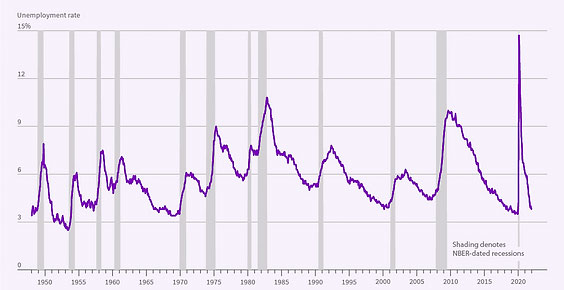Since the conception of Americas’ meta titan that is the U.S economy, we have observed the natural ebs and flows of the business cycle that bring our country into periods of prosperity and recession. Although recessions are a natural, and surprisingly healthy occurrence, it still rings true to be a time of hardship for millions in nearly every operating industry. In the world of marketing, with its endless adaptable facets, we recognize the almost recession proof entity that is, digital marketing. With an ROI shown time after time, recession after recession, to maintain its consistency, could this be the safest modem in the industry to survive the most dangerous times in business?
What Is A Recession?
A technical recession, as defined by The Federal Bank of San Francisco, is “a significant decline in economic activity spread across the economy, lasting more than a few months, normally visible in real GDP.”
In layman terms, we define a recession as a sustained period of negative economic growth that effects all aspects of the economy. The National Bureau of Economic Research determines when we are in a recession by looking at business cycle data.
The NBER notes the indication of a recession as “the period between a peak of economic activity and its subsequent trough, or lowest point.”
Examine the graph to the right, that outlines recessions in grey.
Notice how common this is. As with everything, our economy must experience loss to seek growth.

Historical Impact of Recessions on Ad Spending
Once we are in a recession, it can be safely assumed (and proven) that consumers have tightened wallets. In fact, In the 2009 recession, median US income decreased by 4.2% (Pew Research), even 2 years following the recession.
Because of this, advertisers generally deem it appropriate to cut ad spending during these times. After all, it’s the smart thing to do, right?
WRONG, John. Think again.
In the last 2008 recession, the marketing industry experienced a steep decline in advertising expenditures. Median ad spending cut overall by 13%. Drops included an average of 22% by radio, 27% by newspaper, magazines faced 18%, television by 5%, and online/digital advertisements by 2%. Notice how digital advertisements took the most shallow cut.
Now, lets take a look at this study, outlining the cut in advertising spending historically through recessions along with survey data that higher spending would have resulted in increased sales.
McGraw-Hill Research analyzed 600 B2B companies and found that those who maintained or increased advertising grew significantly … both during the recession and the following three years. In fact…sales of companies that advertised aggressively had grown 275% over those that didn’t.
Advertising executive Roland S. Vaile tracked 200 companies through the recession of 1923. He reported in the April, 1927 issue of the Harvard Business Review that companies that had continued to advertise during the economic downturn were 20% ahead of where they had been before the recession, while companies that reduced advertising were still in the recession, 7% below their 1920 levels
Buchen Advertising tracked advertising dollars vs. sales trends for the recessions of 1949, 1954, 1958 and 1961. They found that sales and profits dropped at companies that cut back on advertising and, that after the recession had ended, those same companies lagged behind the ones that maintained their ad budgets.
After COVID-19, the online sphere became vastly larger as searches for online services went up 23% YOY in the United States. Not only is digital marketing superior in its customizable engagements, it is grasping a wider reach then ever before. People are turning to the online environment where they previously have not. For example, take a look at the CBRE that researched and established an in 2020 an 8.1% decline in retail sales, but a 25% increase in ecommerce! Digital advertising is one of the fastest growing industries we are observing today.
What Does This Mean For You, almighty advertiser?
Recessions are going to happen, that is inevitable, and your business may need to make necessary cuts to stay afloat. The point we are driving here is that those cuts should be as far off your digital marketing budget as possible! This is where you keep your revenue flowing in times of recession.

